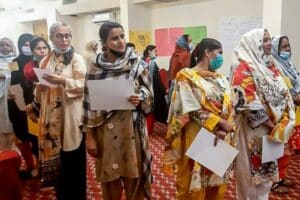KARACHI – Parveen Bano has dedicated herself to securing a better future for Pakistani women workers.
When the 56-year-old lost her husband several years ago, she became the only breadwinner for her family of three in Karachi. She began her own sewing business out of her home. Yet the road was difficult: She endured verbal harassment from contractors, experienced a persistent gender wage gap, and she had to pay for costly repairs to her sewing machine.
“I suffered from a lot of mental stress, constantly needing to fight for a fair wage,” Bano tells Better Work. “Pakistani female workers struggle with low wages and the burden of household responsibilities, lacking awareness concerning their labour rights. I felt the urge to put my experience at the disposal of other women, because this needs to change.”
Bano recently became one of 20 new master trainers who attended the Better Work Pakistan’s Home-Based Women Workers Training of Trainers, run in coordination with Pakistan’s Home-Based Women Workers Federation and made possible through the support of Global Affairs Canada. As part of Better Work’s strategy to boost women’s empowerment, the main goal of the programme is to give these master trainers the capacity to train home-based workers to strengthen their skills and self-advocacy, focusing on issues like financial literacy and gender. As Better Work is launching a full country operation in Pakistan in 2022, with developmental support of the European Union and the governments of Australia and Pakistan, the programme will continue to partner with national organizations that represent home-based workers in order to support them.

According to the World Bank, female labour force participation in urban Pakistan is among the lowest in the world, hovering around 10% for the last two decades. Many women had to drop out of schools due to safety or financial constraints, while others fear resistance from their families and communities when they pursue jobs outside the home.
“Unlike other garment-producing hubs worldwide, some 80% of the people formally employed across Pakistan’s garment factories are men,” says Anne Shanali Weerasuriya, one of the Better Work coaches. “Women workers in Pakistan are active in the informal sector, working in their houses either through middlemen or factories’ subcontractors.”
In their homes, women may cut fabric or conduct basic sewing operations, eventually passing unfinished clothing items to the main factory for a minimal price. Bano has trained over 60 home-based workers since October. The programme in total has trained over 700 women between the ages of 15 and 60. Many are illiterate women who live in rural areas. Following the Better Work curriculum, she says her teachings are based on a participatory approach, through discussions and tangible examples.
“As a result of the trainings, a few women in a village I’ve visited have started making budget plans, writing down their expenses and income, eventually managing to enroll four children in school with the extra money they’ve saved,” Bano says.

Jameela Abdul Latif, 55, from the city of Hyderabad, is another Better Work master trainer. The mother of seven says society in Pakistan tends to frown upon working women.
“The biggest challenges I had to face throughout my career have been the constant talking behind my back between my husband and neighbour, because of my job,” she tells Better Work. Sexual harassment is another crucial and sensitive point the trainers and the trainees have started discussing with each other.
“Harassment in Pakistan is not only limited to unwelcome sexual advances, requests for sexual favours and verbal or physical conduct, but also includes rape, acid throwing and honour killings,” says General Secretary of the Pakistan’s Home-Based Women Workers Federation, Zehra Khan. “We hear from many workers of cases of harassment they or their children are victims of, especially when visited by factory contractors.”
Khan says it is pivotal that women in Pakistan understand what behaviour constitutes sexual harassment, what law regulates the matter and who to contact in such cases.
“The awareness of the attendees has increased thanks to the trainings,” Khan says. “Women now sit together and talk about this very sensitive issue, also discussing and looking for solutions.” Master trainers also reap the benefits of the mentorship they’ve received through Better Work.
Back in Karachi, master trainer Bano says she is trying to model the behaviors.
“I’ve started implementing the teachings to demonstrate how raising one’s own voice can bring change,” she says. “It’s been a triumph. My self-confidence has won.”